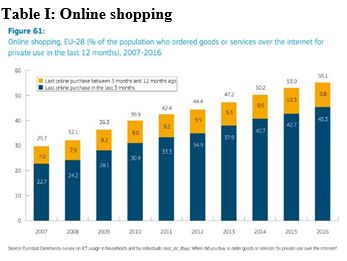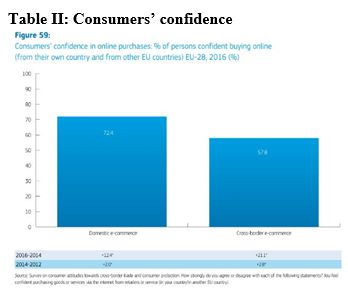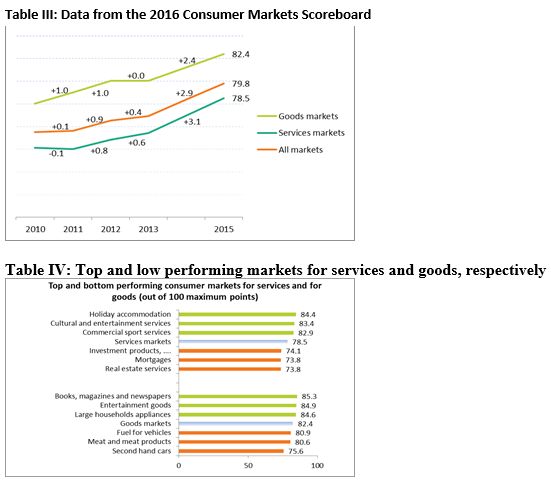Analytics, EU – Baltic States, Internet, Markets and Companies, Modern EU, Retail, Technology
International Internet Magazine. Baltic States news & analytics
Saturday, 20.04.2024, 04:49
Consumers are shopping increasingly online
 Print version
Print versionThe Consumer Scoreboards provide an
overview of how the Single Market works for EU consumers. Published since 2008,
these reviews aim to ensure better monitoring of consumer rights and provide evidence
for policy- and decision-making.
There are two types of Scoreboard,
published in alternate years and based on large scale surveys:
· The Consumer
Conditions Scoreboard, which monitors
national conditions for consumers in three areas: 1. knowledge and trust, 2.
compliance and enforcement, 3. complaints and dispute resolution. It also
examines progress in the integration of the EU retail market and in e-commerce.
· The Consumer Markets
Scoreboard, which tracks the
performance of over 40 consumer markets on the basis of key indicators such as
trusting that sellers comply with consumer protection rules, the comparability
of offers, the choice available in the market, the extent to which consumer
expectations are met, and the detriment caused by problems that consumers
encounter. Other indicators, such as switching and prices, are also monitored
and analysed.
The previous, 2016 Consumer
Markets Scoreboard, see at:
http://europa.eu/rapid/press-release_IP-16-2931_en.htm
For retailers, however, the
Scoreboard shows that many are still reluctant to expand their online
activities and continue to have concerns about selling online to consumers in
other EU countries. Such concerns are mainly linked to a higher risk of fraud
and non-payment in cross-border sales, different tax regulations, differences
in national contract law and in consumer protection rules.
While consumer conditions have
improved overall since the last Scoreboard, the levels of trust, knowledge and
protection still vary greatly between EU states.
Commissioner V. Jourová said on the occasion of the review’s publication that it was the EU’s
priority “to improve peoples and smaller retailers’ trust in the Digital Single
Market”. She added that EU consumers were now more confident when they shop
online. At the same time, the EU institutions have equipped consumers with a
quick procedure to get their money back if something goes wrong, even when
buying from another country.
The EU task is now is to
encourage “more businesses to respond to this growing demand”, she added.
More trust in e-commerce but barriers remain, including for retailers
The Scoreboard shows that consumer
trust in e-commerce has dramatically increased. In ten years the share of
Europeans buying online has almost doubled (from 29.7% in 2007 to 55% in 2017).
Since the last Scoreboard consumers' levels of trust have increased by 12
percentage points for purchases from retailers located in the same country and
by 21 percentage points for purchases from other EU Member States.
Although there has been much
progress, the Scoreboard shows that consumers are still facing obstacles when
trying to buy from online retailers based in another EU country. For example,
13% of respondents reported a payment being refused and 10% were refused
delivery of products to their country.
As for retailers, only 4 out
of 10 of those currently selling online said that they are considering selling
both domestically and across borders in the coming year. Many still have
concerns about selling online in other countries, namely because of a higher
risk of fraud, differences in national tax regulations or national contract law
rules, or differences in consumer rules.
The Commission has made a
proposal for modern digital contract rules to harmonise these rules for online
sales of goods, and to promote access to digital content and online sales
across the EU.
Consumer rights are still low and uneven across the EU
Compared to the previous edition of
the Scoreboard, consumers are more aware of their rights. On average, 13% of
consumers are aware of their key rights (an increase of 3.6 percentage points
since 2014). However, consumer conditions are generally better in northern and
western EU countries than eastern and southern ones.
Thus, 94.5% of Finns complain
when they encounter a problem, for example, whereas only 55.6% of Bulgarians do
so. Exposure to unfair commercial practices, such as the use of aggressive
marketing techniques, also varies greatly: 40.9% of Croatians are affected, in
comparison to 3.4% of Austrians.
To tackle these issues, the
Commission is working on a proposal to update consumer rules. The aim is to
make sure that every European consumer is aware of their rights and that these
rights are correctly enforced throughout the EU.
The 2017 Scoreboard shows that
retailers' knowledge of consumer rules hasn't improved since the previous
edition. Only 53.5 % of their answers to questions on basic consumer rights
were correct. Again the level of knowledge varies between countries, with only
36.2% of Croatian retailers knowing these rights compared to 62.3% of retailers
in Germany.
Improvements in handling complaints
While consumers are finding fewer reasons to complain, the ones who have done so are more satisfied with how their complaints are handled.
However, almost one third of consumers decided not to complain, as they considered the sums involved were too small (34.6%) or that the procedure would have taken too long (32.5%).
This is why the Commission has improved the Small Claims Procedure (since 14/07/2017), which now allows consumers to benefit from a fast-track online procedure for claims up to €5,000. The Commission is also encouraging out-of-court settlements with the Online Dispute Resolution (ODR) platform, which offers easy online access to alternative dispute entities for online transactions.


More on consumers: = Report;
= Factsheet;
= Infographic;
= Consumer
Scoreboards; = Digital
Single Market.
Source:
http://europa.eu/rapid/press-release_IP-17-2109_en.htm?locale=en









 «The Baltic Course» Is Sold and Stays in Business!
«The Baltic Course» Is Sold and Stays in Business!

